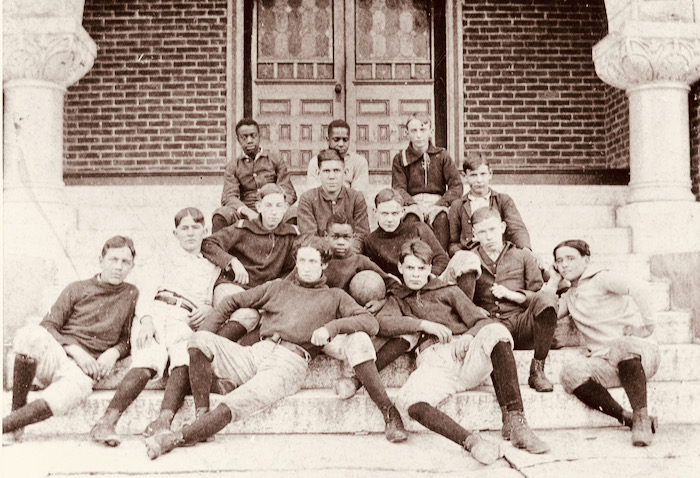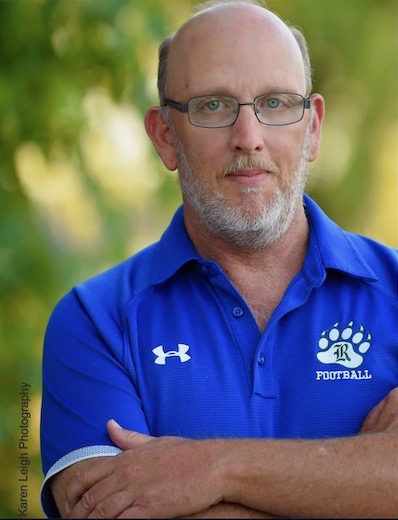
What is the value of a high school team? One might spend a moment peering back more than a century at the 1896 Indiana Soldier’s and Sailor’s Home football team. The visionary institution was founded in 1865 to provide a solid education and vocational training for orphans of Civil War veterans. Once those kids were given a good start, the Home’s mission expanded to care for all “at risk” kids. Among other remarkable accomplishments of the facility, the football team was integrated.
.
By MARTIN DAVIS
Author of 30 Days with America’s High School Coaches
In the wake of the Super Bowl, one question continues to perplex journalists and academics alike:
How does the NFL–drowning in racism lawsuits, grossly overpriced tickets, merchandise, food and parking, player health issues, and the ongoing soap opera of team-owners-acting-badly–remain so popular?
How popular?
According to Variety, in 2021, 8 of the 10 most-watched TV shows were NFL games; so were 15 of the top 20. College football games also had two entrants on the top-20 list, meaning football accounted for all but three of most popular events people watched.
The answers to the question are as varied as the people who watch the sport. The league has perfect parity! No, it’s the unique pregame rituals! No, it’s that its something that people can watch together! No, football is “sewed into the psyche of America!” …
… this could go on for several thousand words, but you get the idea.
Here’s the funny part, though. Among those who coach the sport at the high school level, the NFL isn’t necessarily all that popular.
 I have no data sets to back that up. Just my, admittedly, limited experience coaching the sport—and my experience interviewing high school coaches nationwide for my book, 30 Days with America’s High School Coaches.
I have no data sets to back that up. Just my, admittedly, limited experience coaching the sport—and my experience interviewing high school coaches nationwide for my book, 30 Days with America’s High School Coaches.
I, along with several coaches I’ve come to know over the years, are turned off by the sterility of the NFL game. It’s almost too perfect.
Take Super Bowl LVI in Los Angeles. The game was played in a gawdy—though undeniably stunning—$5 billion mecca. (The fact that it sits in Inglewood, one of LA’s poorer communities, is matter for another essay.)
The weather inside was perfect. The lighting was perfect. The freaking grass (artificial) was perfect. The fans were perfect (Hollywood moved to Inglewood for game day). The players were perfect. The uniforms were perfect. The halftime show was perfect. The camera angles? Yeah, perfect, too.
But all that perfection is rather akin to evangelical theology—all shine, no depth.
For evangelicals, all the salvation talk and dancing in the Lord isn’t enough when life’s most pressing issues face us. Just ask those who are leaving Willow Creek in drovers. (Actually, you don’t have to ask them—Willow Creek did and, to its great credit, published the results.)
Turns out that glitz can only take you so far. OK—glitz can take you really far.
But at the end of the day, it misses the bigger questions in life.
I can’t explain the NFL’s allure. I’m not that smart—or that interested, to be honest with you.
But I do have something of a handle on football’s allure. And it’s not the game. (OK—it’s the game a little bit—you don’t spend hours studying schemes and game film if the game itself doesn’t have some appeal.)
The allure of football—and I would argue any sport that requires a combination of skill, dedication, commitment, team work, and a willingness to sacrifice a lot to be able to play it—is what it asks of us.
Above all, it asks that we sacrifice everything for the other.
That’s what a surging number of NFL players are saying about their switch from playing at the highest level of professional football to coaching high school.
John Kitna, a former quarterback and now coach at Burleson High School in Texas said this of coaching his mostly underprivileged kids:
“It was just a realization that I wanted to help, do what I could do, to get them to college, to get the academic piece even if football wasn’t going to be their long-term thing. To help people chase dreams.”
At Milford Mills Academy in Baltimore, Maryland, Reggie White Jr coaches. He played in Super Bowl XXIX and had a solid NFL career. So why high school?
“I went to school here, this school system, we’re here in the Baltimore public schools, it’s family and that’s how I was treated by my coaches,” White said. “It made me want to be the person helping someone find their way, to achieve, get to college.”
That same line of thought resonates through most every person ESPN profiled in its piece about the 169 NFL coaches who now coach in high school.
That’s the part of the game that really matters. The part that most never see. Because honestly, for most people, it’s too darn hard.
It’s hard physically. It’s hard emotionally. It’s hard spiritually.
And that’s what makes it great.
In my own book, 30 Days with America’s High School Coaches, I dive deeper into the lives of high school coaches and the impact they have on their players, their teams, their schools, and their communities.
I can’t say for sure how many of them watch the NFL—or the professional equivalent in their game— but I suspect most watch some and very few are totally engrossed in it.
That’s because those who really understand sport and its value are too busy doing it to watch it.
Or they’re too busy taking the lessons they learned in sports and using those to help people in their communities in other ways.
At the end of the day, what makes the game great has nothing to do with the game at all.
It has everything to do with being fully human.
No wonder the game is so popular.
.
.
 Care to read more?
Care to read more?
ARE YOU INTRIGUED by this column from Martin Davis? Then you will definitely enjoy his book: 30 Days With America’s High School Coaches.
You can follow Martin’s work through his personal website, MartinDavisAuthor.com, which describes his work as an author and editor. On that front page, you’ll also find a link to his recent columns for the Fredericksburg, Virginia, Freelance Star.
Look around that website and sign up to receive free updates from Martin about new columns.
You’ll be glad you did!
